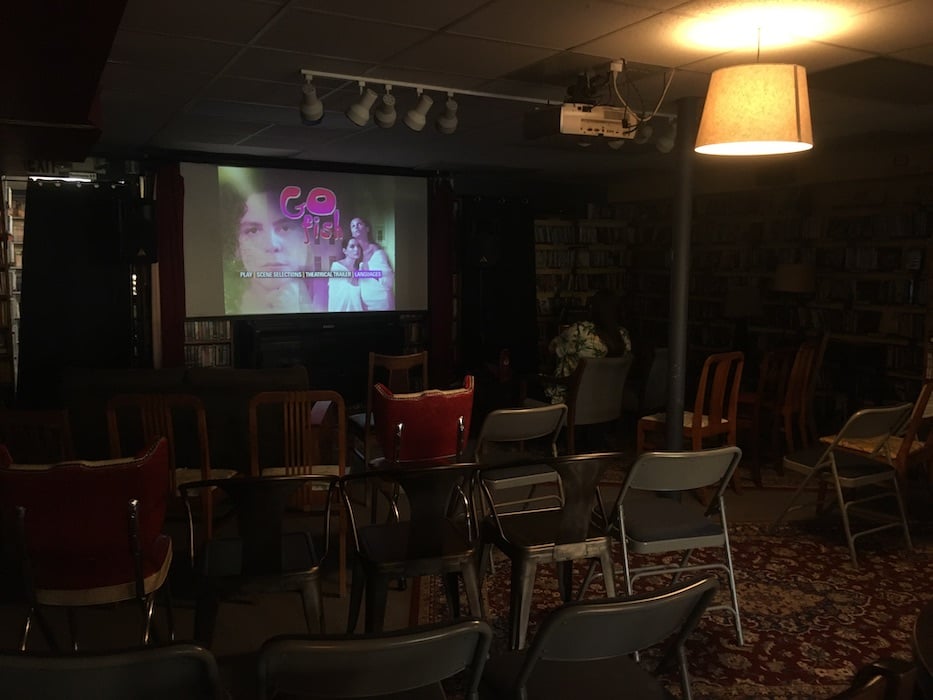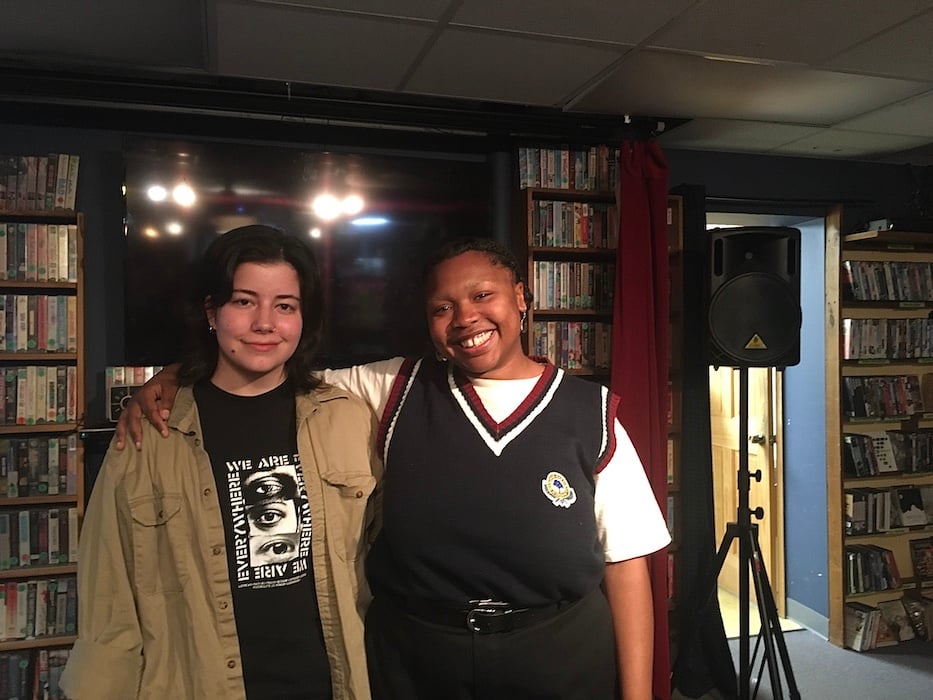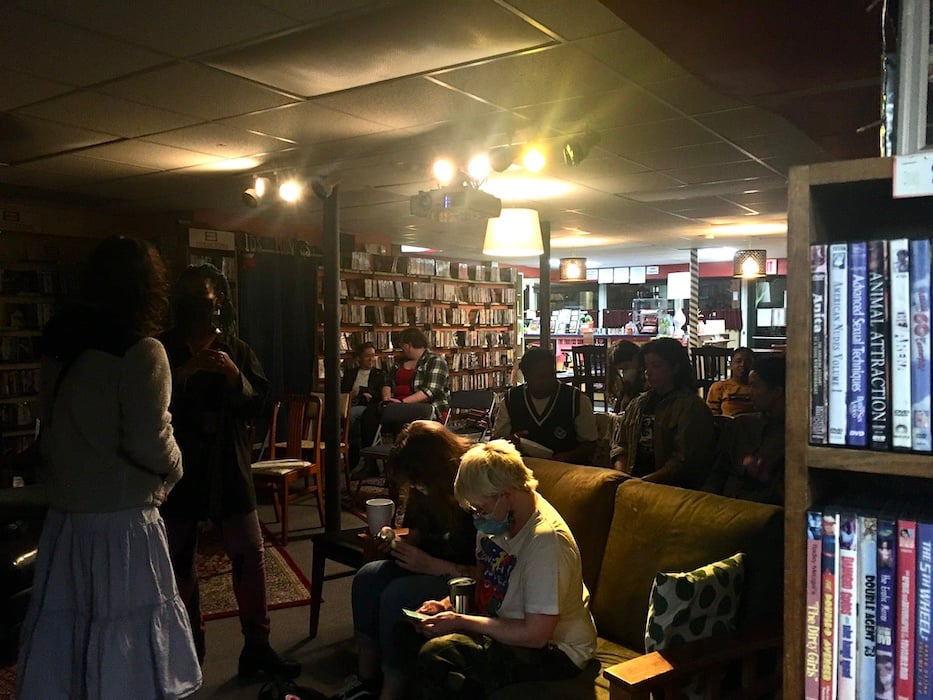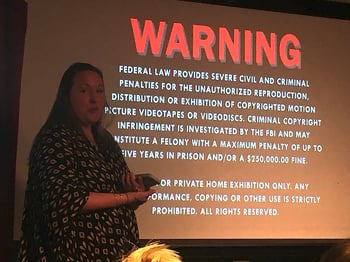
KeQing Tan Photos.
Guinevere Turner looked up at the camera, seated cross-legged on her living room couch. Her words arrived in a voice-over. “We were supposed to meet so long ago. We’re way behind. It’s Max, my name is Max.”
Lit by the dim glow of a projector screen, visitors at Best Video Film & Cultural Center watched as Turner stepped into the role of Max West in the 1994 film Go Fish. As they gathered to see it together, newbies and cinephiles alike shared snacks and laughed in unison.
On a recent Thursday, it marked the final film in “Dyke Dramas,” a collaboration among East Rock House, the New Haven Pride Center, Hamden Pride, and Best Video Film & Cultural Center (BVFCC) that together is known as the Queer Film Club. The club grew out of a twin love for 90s queer and indie film among East Rock House co-founders Suyane Oliveira and Marianna Apostolakis.
The pair began discussing the idea over the summer of 2022, then got in touch with BVFCC Executive Director Julie Smith. She recruited fellow collaborators. The rest is cinematic history.
“Suyane and Marianna pulled in East Rock House, and I pulled in Hamden Pride. I thought it was a great way to cross the town lines,” Smith said. Smith also credited Jules Larson, a former Best Video employee, for helping bring the series together.
After a few Zoom meetings, the Queer Film Club’s efforts came to fruition in early January with a screening of the 2015 romantic drama Carol. In February, it returned with the film Born in Flames, then The Watermelon Woman in March.

Marianna Apostolakis with friend Desiré Graham. KeQing Tan Photos.
The first three films drew crowds of queer people from across greater New Haven to Best Video.
“Julie and I would keep running to the back when people showed up to get more seats,” Apostolakis remembered.
Go Fish’s turnout, similarly, did not disappoint. Some 30 people, who occupied couches and mismatched lawn chairs, filled BVFCC as showtime drew near. Some lounged with snacks and drinks while others milled about, studying shelves of Blu-rays.
At the center of the impromptu theater, a projector screen displayed the film’s menu, with the words Go Fish spanning the screen in warped pink lettering. The chatter in the room fell to a hush as Apostolakis, Smith, and Hamden Pride co-founder Jacky Forcucci faced the audience to introduce themselves and the movie.
“There’s something really meaningful about watching queer, indie films with a queer audience. It changes a lot how I experience these films,” Apostolakis said.

“Dyke Dramas” also established Best Video as an important cultural hub, Smith said. She noted that the series, among other events, helped bring in people who hadn’t known about the organization’s vast film resources. To her, it is important that Best Video presents programming that is open and welcome to everyone, especially the LGBTQ+ community.
Go Fish was directed by lesbian filmmaker Rose Troche and written by both Troche and actress Guinevere Turner. It premiered at the Sundance Film Festival in 1994, and later grossed $2.4 million by June of that year. Forcucci (pictured below) described it as revolutionary: while most lesbian films at the time were filled with soft porn, Go Fish instead captured the awkward spontaneity of a first kiss.
Furthermore, every actress involved in the making of Go Fish identified with the sexuality they portrayed. “There was the complaint that people were casting straight actresses to play lesbian roles,” Forcucci said, “But Go Fish was different.”
 For the next hour and a half, Best Video came alight with the unlikely romance between celibate Chicago lesbians Max and Ely. In black-and-white film, Troche built a narrative laced with warmth, friendship, and well-placed punchlines.
For the next hour and a half, Best Video came alight with the unlikely romance between celibate Chicago lesbians Max and Ely. In black-and-white film, Troche built a narrative laced with warmth, friendship, and well-placed punchlines.
The room shared a laugh after Max’s friends discussed alternative words for the vagina: “Never underestimate the powerful woman that’s been deprived of the honeypot!”
Amidst suggestive conversation and lightheartedness were also moments of heavy reflection. Go Fish touched upon ostracization, struggling with defining one’s sexual orientation, and the expectations of society on lesbians. In one haunting scene, Max imagined herself married to a man. As she stood stiffly in a wedding dress, turned towards the viewers, she said, “I hate this eerie feeling that a man’s waiting for me.”
The room stilled entirely; it was possible to hear the hum of a faraway box fan. But as quickly as it had begun, the scene ended, merging into another moment of cheerful dialogue with a blurred swipe of the camera.
Even after the film ended, many visitors remained seated, talking amongst themselves. Quotes and inside jokes from the movie bounced throughout the room: “I loved ‘nail-cutting foreplay,’” one attendee laughed. Among them, audience member and Atticus Bookstore employee Liz Dimiele remembered attending her first film screening.
“Julie reached out to me about selling books at the first one,” she recalled. “Carol is based on a book by Patricia Highsmith. But none of the other ones have been based on books.”
In the months that followed, she came back to Best Video exclusively for the screening event. She hadn’t heard of the other films, but felt it added to the experience. “I think the great thing about the term ‘queer’ is how capacious it is. Most of the films we’ve watched here have not been mainstream, and they’ve felt more queer to me."
Dimiele’s appreciation of the films’ uniqueness spoke to the central aim of “Dyke Dramas:” to celebrate queerness through a new lens. Apostolakis, when selecting the films, wanted it to be a novel experience for the audience. Their favorite of the series, The Watermelon Woman, had niche humor and content that mainstream media lacked, they said. Watching it with a community of queer people gave them a sense of contentment and satisfaction.
Both Smith and Apostolakis hinted at the possibility that the series might continue, but until then, “Dyke Dramas” had drawn to a close. Even after Go Fish faded to black, however, attendees lingered. The warm community built by this event would remain long after the credits rolled.
This article comes from the 2023 Cohort of the Youth Arts Journalism Initiative. KeQing Tan is a senior at Wilbur Cross High School and the Educational Center for the Arts.